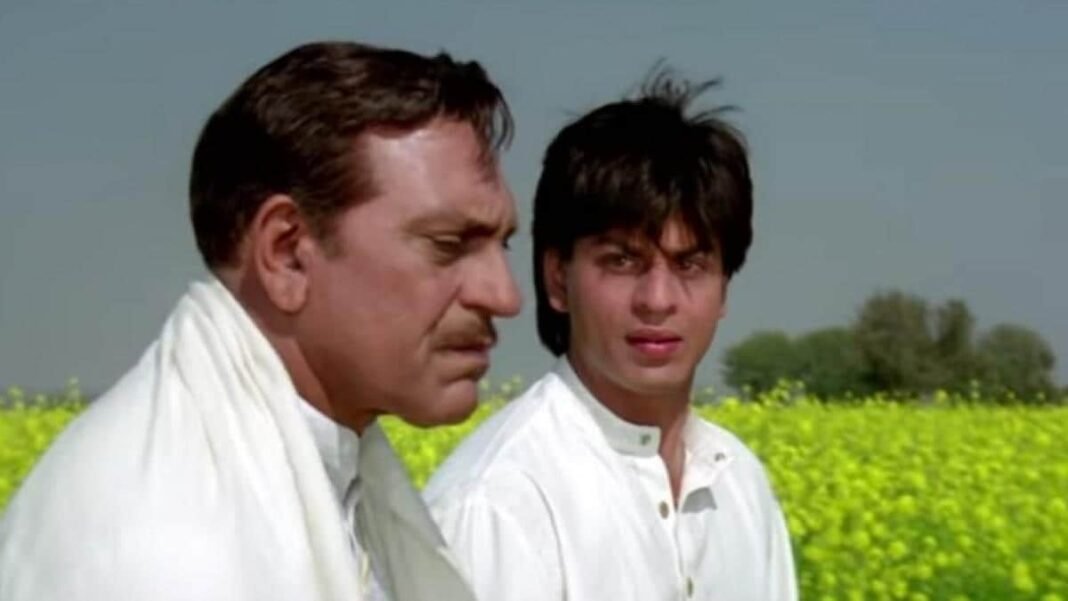In a surprising revelation, renowned filmmaker Karan Johar recently shared a lesser-known aspect of his early days in the film industry, disclosing that he was once scared of the legendary actor Amrish Puri on the sets of the iconic film “Dilwale Dulhania Le Jayenge” (DDLJ). Johar, known for his candor, reflected on the unique dynamics of working alongside the veteran actor and the impact it had on his early experiences in Bollywood.
During a candid interview, Karan Johar reminisced about the days when he served as an assistant director on the sets of DDLJ, a film that would go on to become a classic. Johar, who was in awe of Amrish Puri’s commanding presence, admitted to feeling a sense of trepidation in the legendary actor’s formidable presence.
Amrish Puri, known for his powerful and often villainous roles, portrayed the character of Baldev Singh, the strict father of Simran, played by Kajol. The intensity of Puri’s performances, coupled with his towering stature in the industry, left a lasting impression on those who had the privilege of working with him.
Johar, in his revelations, painted a vivid picture of his initial encounters with Amrish Puri, describing how the veteran actor’s imposing persona used to leave him “traumatized.” The fear, he confessed, was not just a reflection of Puri’s on-screen prowess but also the result of the actor’s ability to effortlessly switch between being a strict patriarch on camera and a genial, friendly presence off-screen.
Karan’s Interaction
As an assistant director, Johar’s interactions with Amrish Puri extended beyond the lens. He recalled moments when Puri, fully immersed in his character, would continue to maintain a stern demeanor even during breaks. The boundary between fiction and reality blurred for Johar, creating an atmosphere that fueled his trepidation.

However, as the interview unfolded, Johar fondly recollected how his perception of Amrish Puri underwent a transformative shift over time. The initial fear gradually gave way to admiration as he observed the actor’s professionalism, dedication, and the genuine warmth that defined their off-screen interactions.
Amrish Puri’s contribution to the world of Indian cinema is unparalleled, and his impact transcends generations. Beyond his formidable on-screen presence, Puri was known for mentoring and inspiring young talents in the industry. Karan Johar’s journey from being “traumatized” by Puri to appreciating his craft stands as a testament to the actor’s influence on those who had the privilege of working alongside him.
The revelation about Johar’s initial fear of Amrish Puri provides a rare glimpse into the dynamics that unfold behind the scenes in the film industry. It humanizes the larger-than-life figures of Bollywood, showcasing the vulnerability and growth experienced by aspiring talents as they navigate the industry’s rich tapestry.
As Bollywood enthusiasts revisit the timeless charm of DDLJ and celebrate its impact on Indian cinema, Karan Johar’s revelation adds a personal touch to the film’s legacy. It emphasizes the transformative journey of individuals within the industry and highlights the profound influence that iconic figures like Amrish Puri continue to exert, even beyond the frames of the silver screen.

Furthermore, Karan Johar’s revelation about being scared of Amrish Puri on the sets of DDLJ provides a refreshing and honest perspective on the dynamics of working in the Indian film industry. It underscores the multifaceted nature of Bollywood, where fear can coexist with admiration, and where legendary actors contribute not only to cinematic brilliance but also to the growth and transformation of the talents around them.
Karan Johar’s candid admission has sparked a wave of nostalgia among fans of Indian cinema. The iconic film “Dilwale Dulhania Le Jayenge” holds a special place in the hearts of audiences worldwide, and Johar’s revelation adds an intriguing layer to the behind-the-scenes anecdotes associated with the movie. As fans revisit the classic, they are met with a newfound understanding of the dynamics that unfolded during its making, enhancing their appreciation for the collaborative efforts that went into creating a cinematic masterpiece.
The revelation also sheds light on the unique mentorship that often occurs in the film industry. Amrish Puri, with his vast experience and commanding presence, unintentionally became a figure of inspiration for young talents like Karan Johar. The initial trepidation transformed into valuable lessons and an enduring respect for the craft. In the intricate world of Bollywood, where veterans and novices share the screen, these mentor-mentee relationships contribute to the rich tapestry of storytelling.
As the film industry continues to evolve, stories like Karan Johar’s encounter with Amrish Puri serve as bridges connecting different eras of Indian cinema. The journey from fear to admiration reflects the transformative power of collaboration and mentorship, reminding aspiring talents that the initial challenges they face can pave the way for invaluable growth and lifelong connections in the world of filmmaking.
In essence, Karan Johar’s candid revelation about his initial fear of Amrish Puri provides a glimpse into the nuanced relationships that shape the Bollywood landscape. It not only deepens our understanding of the collaborative dynamics within the industry but also reinforces the enduring impact of legendary figures like Amrish Puri, whose influence extends far beyond the characters they portray on the silver screen. As fans and aspiring filmmakers revisit the timeless charm of “Dilwale Dulhania Le Jayenge,” they do so with a newfound appreciation for the intricate dance between fear, admiration, and growth that defines the journey of artists in the world of cinema.




